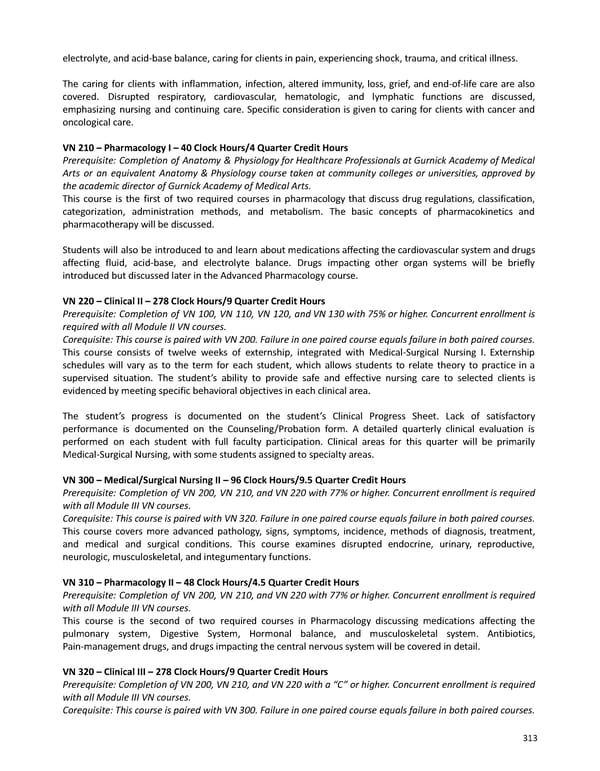electrolyte, and acid-base balance, caring for clients in pain, experiencing shock, trauma, and critical illness. The caring for clients with inflammation, infection, altered immunity, loss, grief, and end-of-life care are also covered. Disrupted respiratory, cardiovascular, hematologic, and lymphatic functions are discussed, emphasizing nursing and continuing care. Specific consideration is given to caring for clients with cancer and oncological care. VN210–PharmacologyI–40ClockHours/4QuarterCreditHours Prerequisite: Completion of Anatomy & Physiology for Healthcare Professionals at Gurnick Academy of Medical Arts or an equivalent Anatomy & Physiology course taken at community colleges or universities, approved by the academic director of Gurnick Academy of Medical Arts. This course is the first of two required courses in pharmacology that discuss drug regulations, classification, categorization, administration methods, and metabolism. The basic concepts of pharmacokinetics and pharmacotherapywillbediscussed. Students will also be introduced to and learn about medications affecting the cardiovascular system and drugs affecting fluid, acid-base, and electrolyte balance. Drugs impacting other organ systems will be briefly introduced but discussed later in the Advanced Pharmacology course. VN220–ClinicalII–278ClockHours/9QuarterCreditHours Prerequisite: Completion of VN 100, VN 110, VN 120, and VN 130 with 75% or higher. Concurrent enrollment is required with all Module II VN courses. Corequisite: This course is paired with VN 200. Failure in one paired course equals failure in both paired courses. This course consists of twelve weeks of externship, integrated with Medical-Surgical Nursing I. Externship schedules will vary as to the term for each student, which allows students to relate theory to practice in a supervised situation. The student’s ability to provide safe and effective nursing care to selected clients is evidencedbymeetingspecificbehavioralobjectivesineachclinicalarea. The student’s progress is documented on the student’s Clinical Progress Sheet. Lack of satisfactory performance is documented on the Counseling/Probation form. A detailed quarterly clinical evaluation is performed on each student with full faculty participation. Clinical areas for this quarter will be primarily Medical-Surgical Nursing, with some students assigned to specialty areas. VN300–Medical/SurgicalNursingII–96ClockHours/9.5QuarterCreditHours Prerequisite: Completion of VN 200, VN 210, and VN 220 with 77% or higher. Concurrent enrollment is required with all Module III VN courses. Corequisite: This course is paired with VN 320. Failure in one paired course equals failure in both paired courses. This course covers more advanced pathology, signs, symptoms, incidence, methods of diagnosis, treatment, and medical and surgical conditions. This course examines disrupted endocrine, urinary, reproductive, neurologic, musculoskeletal, and integumentary functions. VN310–PharmacologyII–48ClockHours/4.5QuarterCreditHours Prerequisite: Completion of VN 200, VN 210, and VN 220 with 77% or higher. Concurrent enrollment is required with all Module III VN courses. This course is the second of two required courses in Pharmacology discussing medications affecting the pulmonary system, Digestive System, Hormonal balance, and musculoskeletal system. Antibiotics, Pain-managementdrugs,anddrugsimpactingthecentralnervoussystemwillbecoveredindetail. VN320–ClinicalIII–278ClockHours/9QuarterCreditHours Prerequisite: Completion of VN 200, VN 210, and VN 220 with a “C” or higher. Concurrent enrollment is required with all Module III VN courses. Corequisite: This course is paired with VN 300. Failure in one paired course equals failure in both paired courses. 313
 2023-2024 | Catalog Page 312 Page 314
2023-2024 | Catalog Page 312 Page 314